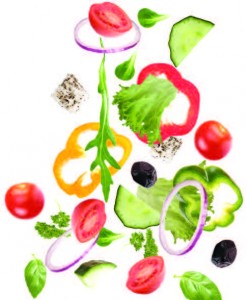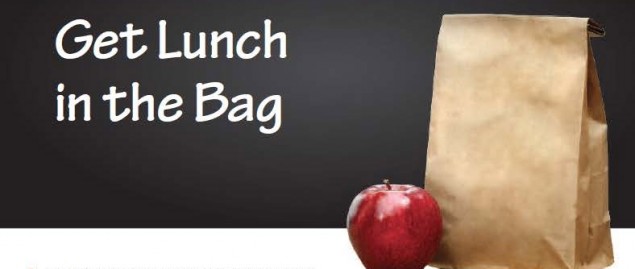Get Lunch in the Bag
As back-to-school season is upon us, parents are once again dreading the grating task of packing lunch for their kids. In recent years, many day schools and yeshivot have wisely begun to focus on nutrition to combat the pediatric obesity epidemic and improve our children’s health, but the new rules limit parents’ choices. It used to be that you only needed to avoid peanut butter because of food allergies; now you may be asked to navigate a host of regulations when preparing your kids’ lunches and snacks. Whatever the rules at your kids’ schools, most of us can use some pointers on quick, healthy meals to ease the morning rush.
Even if you don’t have children or you’re well past your school-lunch years, there are a number of advantages to packing your own lunch on a regular basis:
School Lunch Tips
• For picky eaters, tailor lunch to their tastes, but be sure to include the basics: a serving of both fruit and vegetables, a whole grain and a protein source.
• Make healthy lunches fun—cut foods with cookie cutters, arrange in interesting shapes (flowers, faces, et cetera) and add a note to remind your child you love him.
• Don’t forget the drink! Minimize juice and chocolate milk and send water more often.
• Saves calories: Restaurant and takeout foods are notoriously high in fat, sodium and sugar—even seemingly healthy foods like salads (think cheeses, croutons, Craisins, dressing, mayo, sweetened nuts, et cetera). When you make food at home and bring it to work, you control the ingredients and, consequently, the nutritional value
Kosher Food on the Go
With proper planning, you can enjoy hot or cold food while traveling. Invest in a nice insulated bag with two small ice packs—you want to be able to keep the second one in the freezer for the next day while you’re using the first. Also look for a dedicated thermos to keep hot foods hot. You may even want to get two for meat and dairy.
• Saves money: When you dine out or buy lunch, you pay not just for the food but for the restaurant’s overhead costs too—rent, utilities, taxes, employee wages, hashgachah, et cetera—not to mention tips. You avoid these extra costs when you brown-bag it.
• Saves time: No need to spend time running out to pick something up or deciding what to order in. If your meeting runs late or you need to be out on the road, your lunch is right there waiting for you.
When you pack lunch at home, it’s easy to fall into the convenience trap—especially for kids—selecting foods that are ready-made or easy-to-prepare versus choosing foods based on nutrient content. But preparing wholesome lunches do not need to be time consuming. Here are some typical not-so-nutritious lunches and their healthier alternatives.
Five Super-Fast Lunches
Lunches ready in minutes for those mornings you sleep through the alarm:
• Two slices of whole-wheat bread topped with cheese (toast if there’s time), a box of raisins and grape tomatoes
• Whole-grain pretzels, single-serving hummus, baby carrots and grapes
• Yogurt, banana and granola bar
• Whole-grain crackers, single-serving cream cheese pack, strawberries and a cucumber
• Tuna pouch, whole-wheat pita, pickles and an apple
Before: Salami and mayo on white bread with a bag of chips
After: Turkey-avocado sandwich on whole-wheat bread with grape tomatoes and a pear
What a Difference! Choosing turkey cuts down on the fat and saturated fat content. Avocado offers healthy monounsaturated fat. (If you can’t give up the mayo, at least try a lower-fat version.) And you’ve rounded out the meal with a vegetable and fruit for more fiber, vitamins, minerals and disease-fighting antioxidants.
Before: Pizza bagels and chocolate pudding
After: Homemade whole-grain mini bagels with marinara sauce and part-skim mozzarella—top with broccoli or other veggie of choice; plain low-fat yogurt with a couple of sliced strawberries
What a Difference! You’ve got the whole grains, the lower-fat cheese and the addition of veggies, plus a lower-sugar calcium source and boost of antioxidants from the fruit.
Before: Fish sticks and French fries
After: Leftover salmon from dinner the night before in a whole-grain wrap with bagged salad and a no-sugar-added fruit cup
What a Difference! Although there are better-for-you fish sticks, you’ll get more omega-3s from a salmon fillet. The wrap adds more fiber than the fries, and is much tastier to eat cold. Add the salad to the wrap to make it more filling.
Before: Tri-color pasta salad with mayo-based dressing
After: Whole-wheat pasta with a sprinkle of roasted nuts and cut up vegetables dressed with olive oil and vinegar
What a Difference! Research shows that adding vegetables to a smaller portion of pasta so you end up with the same volume leaves you feeling just as satisfied for fewer calories. The whole-grain pasta adds more fiber, but if you can’t stomach it alone, mix it with regular pasta. Nuts add protein and fat for satiety, while a simple olive oil and vinegar dressing is less processed than a mayo dressing and full of healthy fat. If no nuts are allowed, opt for beans, low-fat cheese or seeds.
Before: Egg or tuna salad with pita chips
After: Egg or tuna salad made with low-fat mayo or nonfat yogurt, with added chopped celery, carrots and green onion, along with whole-grain crackers and an orange
What a Difference! The calorie and fat savings are a no-brainer, as is the added fiber and nutrients from the additional vegetables. Swapping crackers for fried chips cuts down fat and calories too.
Before: Leftover spaghetti and meatballs
After: Brown rice and beans with salsa and avocado
What a Difference! Using drained canned beans, jarred salsa and a quick-cooking brown rice saves a lot of time without compromising much in the way of nutrition.
 A Salad for Every Day of the Week
A Salad for Every Day of the Week
If you’re the type who loves the variety, convenience and healthfulness of picking up a salad for lunch, it’s not that hard to create your own at home. Here are five different, healthy salad ideas for your five-day school or work week. Pair any with a serving of whole-grain crackers or a small roll and a fruit for a balanced meal. Keep dressings in small well-sealed containers until you’re ready to eat.
Monday: Spinach Salad
Fresh baby spinach, sliced strawberries or pears and almonds (preferably toasted), dressed with red wine vinegar, olive oil and a dash of sugar or sugar substitute
Tuesday: Spicy Bean and Mango Salad
Black beans mixed with cubed mango, red pepper and a chopped red onion, seasoned with salt and cilantro (frozen cubes will work, although fresh is better) and dressed in olive oil
Wednesday: Greek Salad
Lettuce, black olives, feta cheese and tomato slices, seasoned with oregano and garlic and dressed with olive oil and lemon juice
Thursday: Chicken Club Salad
Lettuce, cubed grilled chicken breast, avocado, sliced tomatoes and cucumbers, dressed with low-fat mayo, olive oil, garlic and parsley
Friday: Chickpea and Edamame Salad
Lettuce with chickpeas, edamame, dried cranberries and peppers, dressed with olive oil, cumin, salt and pepper
Shira Isenberg is a registered dietitian and writer in Nashville, Tennessee. She has a master’s degree in public health nutrition from Hunter College in New York.
Listen to Shira Isenberg discuss healthy school lunches at ou.org/healthierlifestyle.

